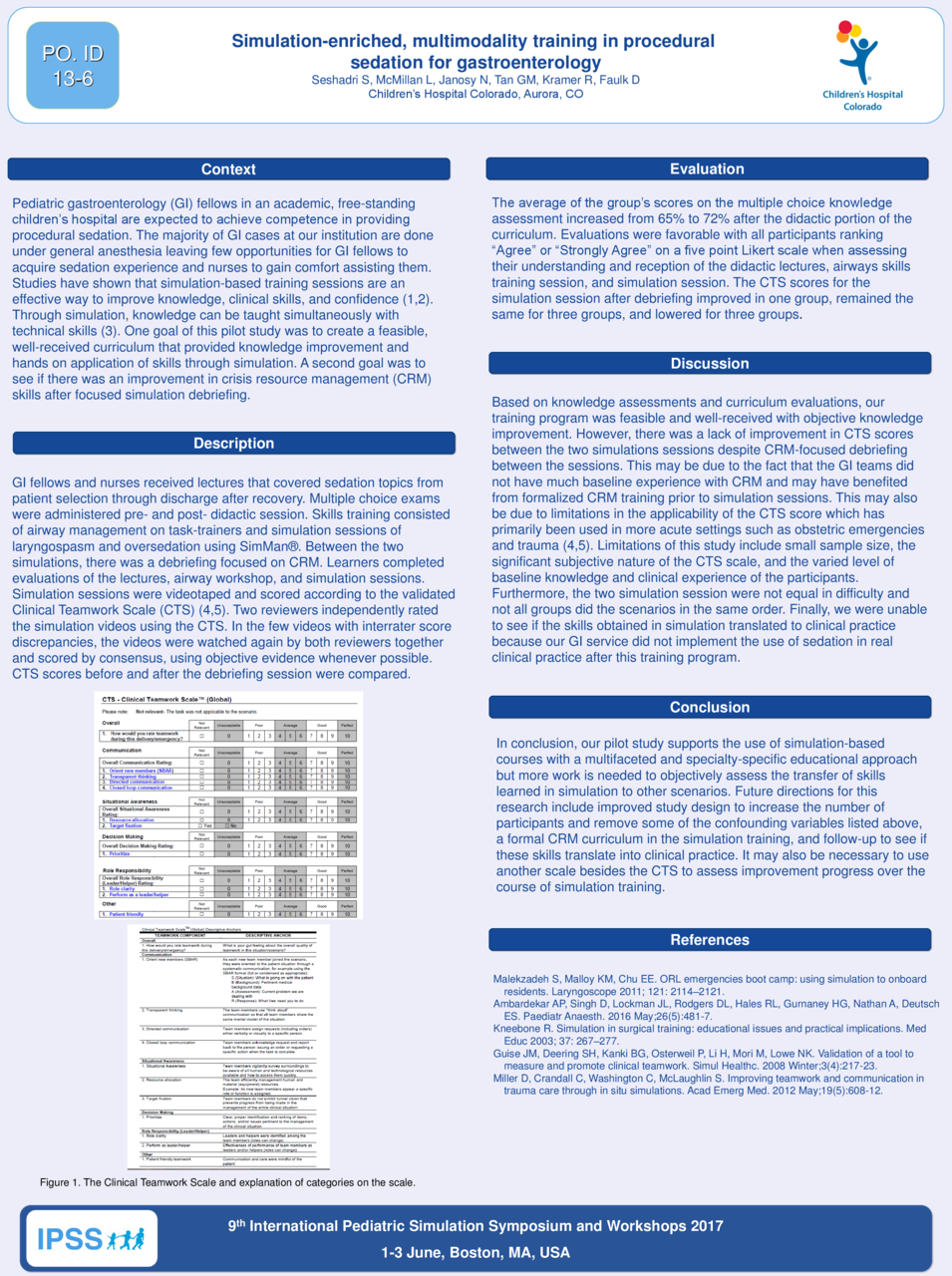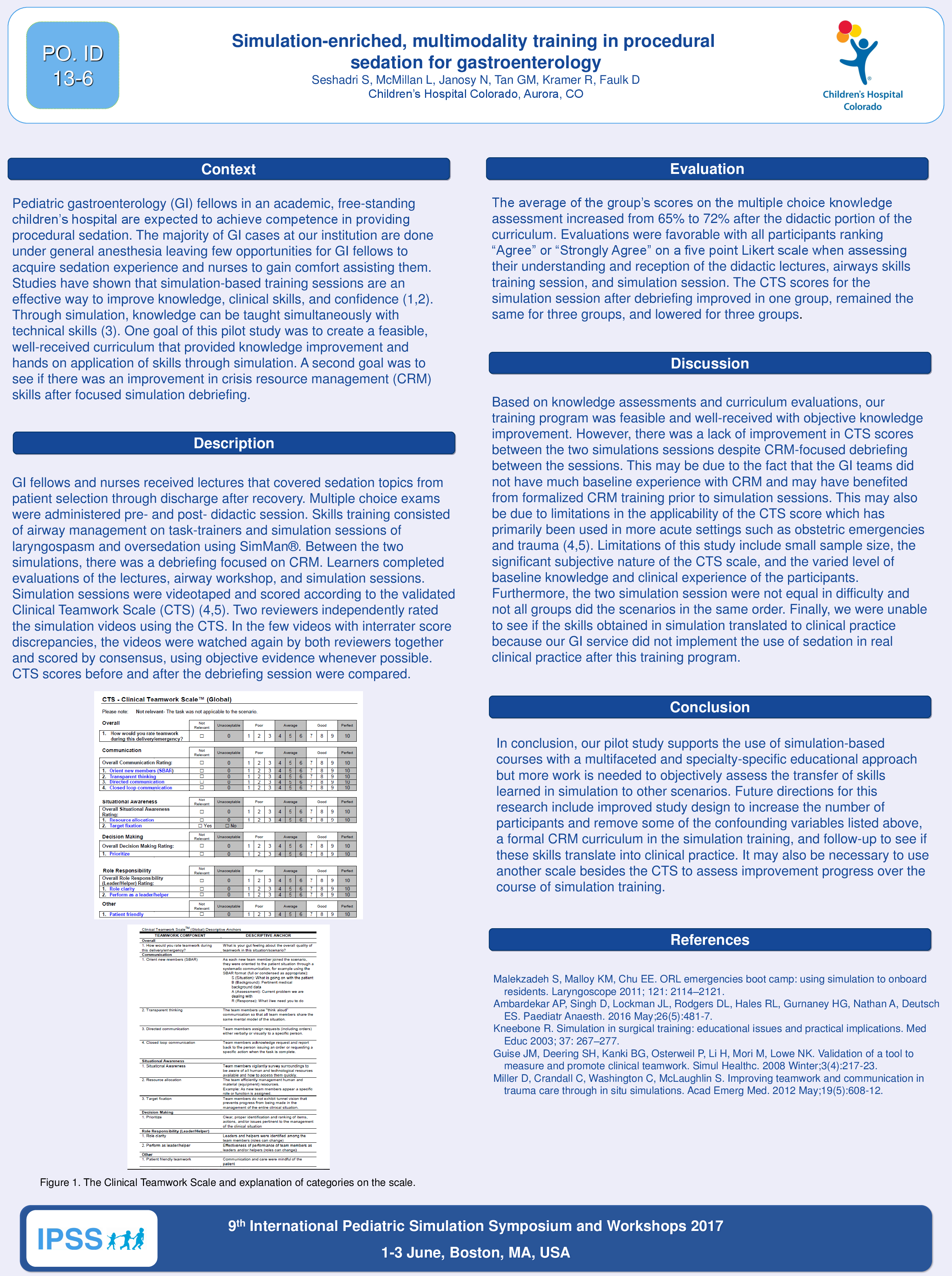Abstract
Context
Pediatric gastroenterology (GI) fellows in an academic, free-standing children’s hospital are expected to achieve competence in providing procedural sedation. The majority of GI cases at our institution are done under general anesthesia leaving few opportunities for GI fellows to acquire sedation experience and nurses to gain comfort assisting them. Studies have shown that simulation-based training sessions are an effective way to improve knowledge, clinical skills, and confidence (1,2). Through simulation, knowledge can be taught simultaneously with technical skills (3). One goal of our study was to create a feasible, well-received curriculum that provided knowledge improvement and hands on application of skills through simulation. A second goal was to see if there was an improvement in crisis resource management (CRM) skills after focused simulation debriefing.
Description
GI fellows and nurses received lectures that covered sedation topics from patient selection through discharge after recovery. Multiple choice exams were administered pre- and post- didactic session. Skills training consisted of airway management on task-trainers and simulation sessions of laryngospasm and oversedation using SimMan®. Between the two simulations, there was a debriefing focused on CRM. Learners completed evaluations of the lectures, airway workshop, and simulation sessions. Simulation sessions were videotaped and scored according to the validated Clinical Teamwork Scale (CTS) (4,5). Two reviewers independently rated the simulation videos using the CTS. In the few videos with interrater score discrepancies, the videos were reviewed and scored by consensus according to objective evidence. CTS scores before and after the debriefing session were compared.
Evaluation
The average knowledge assessment score for the group increased from 65% to 72% after the didactic portion. Evaluations were favorable with all participants ranking “Agree” or “Strongly Agree” on a five point Likert scale when assessing their understanding and reception of the material. The CTS scores for the simulation session after debriefing improved in one group, remained the same for three groups, and lowered for three groups.
Discussion
Based on knowledge assessments and curriculum evaluations, our training program was feasible and well-received with objective knowledge improvement. While learners felt subjectively more comfortable administering sedation on evaluations, there was a lack of improvement in CTS scores between the two simulations sessions despite debriefing focused on CRM skills between the sessions. This may be due to the fact that the GI teams did not have much baseline experience with CRM and may have benefited from formalized CRM training prior to simulation sessions. In conclusion, our study supports the use of simulation based courses using a multi-faceted and specialty-specific educational approach.
References:
- Malekzadeh S, Malloy KM, Chu EE. ORL emergencies boot camp: using simulation to onboard residents. Laryngoscope 2011; 121: 2114–2121.
- Ambardekar AP, Singh D, Lockman JL, Rodgers DL, Hales RL, Gurnaney HG, Nathan A, Deutsch ES. Paediatr Anaesth. 2016 May;26(5):481-7.
- Kneebone R. Simulation in surgical training: educational issues and practical implications. Med Educ 2003; 37: 267–277.
- Guise JM, Deering SH, Kanki BG, Osterweil P, Li H, Mori M, Lowe NK. Validation of a tool to measure and promote clinical teamwork. Simul Healthc. 2008 Winter;3(4):217-23.
- Miller D, Crandall C, Washington C, McLaughlin S. Improving teamwork and communication in trauma care through in situ simulations. Acad Emerg Med. 2012 May;19(5):608-12.






